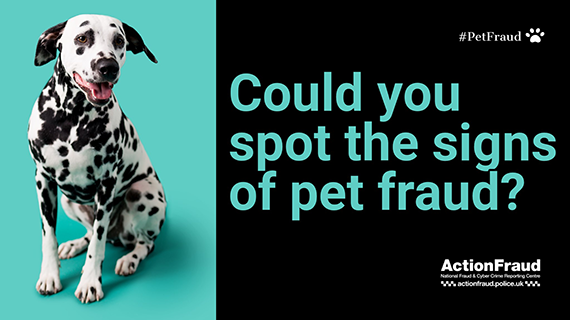
Action Fraud – the national fraud and cyber crime reporting centre – has revealed that more than £2.5m has been lost to criminals through fake pet adverts.
Now it has launched a new campaign urging animal lovers to take extra care when buying a pet online.
Data from Action Fraud reveals that £2,638,323 was lost by prospective pet parents in the 2020/21 financial year, after they put down deposits for pets they saw advertised online. This is an increase of more than 20% compared to the previous financial year.
Capitalising on the rise in people wanting pets during the coronavirus lockdowns, criminals have been posting fake adverts on social media, online marketplaces and specific pet-selling platforms.
Unsuspecting victims will be asked to pay a deposit for the pet without seeing it in person first, with many criminals using the restrictions caused by the pandemic as a reason why they cannot see the animal.
After the initial payment is made, more and more funds will be requested to cover additional costs such as insurance, vaccinations and even delivery of the pet.
Pauline Smith, director of Action Fraud, said: “Criminals have, and will continue to use, the coronavirus pandemic as an opportunity to scam unsuspecting victims.
“It’s important that if you’re considering purchasing a pet online, that you follow the advice of the Take Five to Stop Fraud campaign by taking a moment to stop and think – it could protect you and your money.
“We would always recommend that you view the animal in person before paying any money. If you cannot see the animal in person, ask for a video call. If something doesn’t feel right, trust your instincts and do not pay any money until you’re certain it’s genuine.”
In the 2020/21 financial year, Action Fraud received over 400 reports a month from victims of pet fraud. Over a quarter (29%) of victims were aged 20 to 29 years old and almost three quarters (74%) of victims were aged 20 to 49 years old.
During April and May 2020, Action Fraud received more than 800 reports per month of pet fraud, indicating that many animal lovers sought to purchase a pet during the first national lockdown.
Dogs and puppies were the most reported animal victims said they were trying to purchase (71%), followed by cats and kittens (20%).
Victims reported being scammed on social media (11%), online marketplaces (25%) and specific pet-selling platforms (37%).


